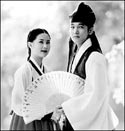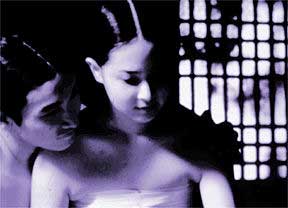Chunhyang


The overwhelming majority of Americans are unfamiliar with the Korean art form of Pansori. It is similar to Peking opera, except the voices are lower. And if that doesn't help, Peking opera sounds like a multitude of dying cats. But seriously, Pansori sounds strange simply because it is something new. Pansori is similar to the oral tradition used to pass along the Bible or stories like The Iliad. Only this time, it is in Korean. Chunhyang is an old Korean folk tale, and this movie tries to tell the story in both a Pansori style (with a storyteller 'singing' and slightly dancing to a drum) and one of traditional cinema.
This duality is what ultimately makes Chunhyang not realize its potential. Listening to a story or reading a book is much different than watching one. A storyteller uses painstaking detail in describing events, so that the listener can construct an image in his/her mind. Revered director Kwon-taek Im (Taebak Mountains) uses Sang-hyun Cho (who wrote the movie with Hye-yun Kang and Myong-gon Kim), the foremost proponent of Pansori to narrate Chunhyang. The story switches between him on stage, seemingly yelling before an audience, and the actual story. Sometimes, his words frame sequences and actors speak in unison with him. The problem is that he minutely describes what is on the screen, and Im follows his words exactly. It works if people are watching him perform in a theater, but becomes distracting when watching a movie. When Cho says somebody walks quickly, the person walks quickly. When Cho says somebody throws a rock, the person throws a rock. Usually, narration in movies serves to impart something unknown instead of simply repeating what is on screen.
Chunhyang tells the story of two young lovers. For a Korean folk tale, it sounds surprisingly familiar. Two young people from different social classes love each other. Chunhyang (Hyo-jeong Lee) is the daughter of a courtesan and Mongyong (Seung-woo Cho) is the son of a local governor. They marry in secret, and Mongyong frequently takes secret trips to meet Chunhyang. Mongyong's father sends him to Seoul to study for his exams, and Mongyong must leave Chunhyang behind or else their secret will be in the open. He promises to come back for her once he passes the exams. In the next three years, a new governor comes to power and demands Chunhyang to serve as his courtesan. She refuses, and he throws her in jail.
As a folk tale, Chunhyang echoes universal themes of love and fidelity in a simplistic manner. As a movie, it leaves some questions unanswered. Sure, Mongyong cannot see Chunhyang, but no letter or any sort of communication for three years? He supposedly loves her deeply, but then wouldn't he make some effort to contact his wife? Im does a great job with how the movie looks (Chunhyang was the most expensive movie ever in Korea, but still cheap by American standards) but the actors are not that great. Lee does almost nothing but giggle and bow her head demurely for most of the movie. And of course, there is the constant switching between Cho and the movie. Chunhyang would be better if Im chose one method and stuck to it, whether it be a movie of Cho delivering the story Pansori style, or the story itself.